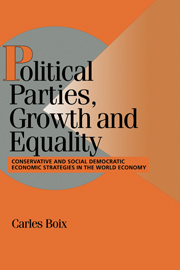 Political Parties, Growth and Equality
Political Parties, Growth and Equality Book contents
- Frontmatter
- Contents
- List of Tables and Figures
- Preface
- 1 Introduction
- 2 Political Parties and the Structural Conditions of the Economy
- 3 Supply-Side Economic Strategies from a Comparative Perspective (I): Public Investment and the Formation of Human Capital
- 4 Supply-Side Economic Strategies from a Comparative Perspective (II): The Public Business Sector and Tax Strategies
- 5 The Social Democratic Project: Macroeconomic Stability and State Intervention in Spain
- 6 The Political and Electoral Dimensions of the PSOE's Economic Strategy
- 7 Turning around the Postwar Consensus: Defining a Conservative Economic Framework in Britain
- 8 The Political and Electoral Dimensions of the Conservative Economic Strategy
- 9 Partisan Strategies and Electoral Coalitions
- 10 Conclusions
- Notes
- References
- Index
- More Titles in the Series
5 - The Social Democratic Project: Macroeconomic Stability and State Intervention in Spain
Published online by Cambridge University Press: 05 June 2012
- Frontmatter
- Contents
- List of Tables and Figures
- Preface
- 1 Introduction
- 2 Political Parties and the Structural Conditions of the Economy
- 3 Supply-Side Economic Strategies from a Comparative Perspective (I): Public Investment and the Formation of Human Capital
- 4 Supply-Side Economic Strategies from a Comparative Perspective (II): The Public Business Sector and Tax Strategies
- 5 The Social Democratic Project: Macroeconomic Stability and State Intervention in Spain
- 6 The Political and Electoral Dimensions of the PSOE's Economic Strategy
- 7 Turning around the Postwar Consensus: Defining a Conservative Economic Framework in Britain
- 8 The Political and Electoral Dimensions of the Conservative Economic Strategy
- 9 Partisan Strategies and Electoral Coalitions
- 10 Conclusions
- Notes
- References
- Index
- More Titles in the Series
Summary
As a result of a prolonged economic crisis beginning in the mid-1970s, the European political scenario went through an unprecedented shift of electoral fortunes in the early 1980s. While Northern European conservatives seized most cabinets, in Southern Europe the Left experienced an unprecedented wave of electoral victories. In 1981 the French and the Greek Socialist Parties secured strong parliamentary majorities. In 1983 the Portuguese Socialist Party rejoined the government, and the socialist Bettino Craxi was appointed prime minister in Italy. The Spanish Socialist Party – Partido Socialista Obrero Español (PSOE) – proved, however, to be the most successful one in the electoral arena. Elected to office in October 1982 with an impressive majority and a lead of 21 percentage points over the conservative opposition, it governed alone until 1993 and, in a minority cabinet with external support from moderate regionalist parties, until 1996.
The Spanish Socialist government provides an excellent opportunity to examine the development of full-fledged left-wing economic policies, particularly in an era of high financial and trade interdependence. The failure of the French expansionary policies initially pursued by Mitterrand and swelling public and trade deficits convinced the Spanish Socialist cabinet of the need to avoid any countercyclical measures to fight unemployment. Unable to rely on weak and divided trade unions, the Spanish government willingly embraced a strategy of macroeconomic discipline as the best means to attract investment and open Spain to the world economy throughout the decade.
- Type
- Chapter
- Information
- Political Parties, Growth and EqualityConservative and Social Democratic Economic Strategies in the World Economy, pp. 105 - 129Publisher: Cambridge University PressPrint publication year: 1998


